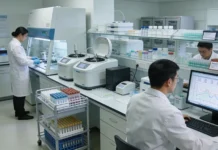The partnership will identify potent, selective and orally bioavailable small molecules that inhibit PTP1B activity in-vivo following stimulation by insulin and leptin to overcome resistance encountered in diabetes and obesity.
Under the multi-year deal, CSHL and GSK scientists will carry out drug development based on a new approach to regulate the enzymatic activity of the phosphatase PTP1B.
CSHL business development and technology transfer vice-president Teri Willey said: “At CSHL, we are striving to achieve mutually beneficial and effective collaborations to accelerate research and develop new therapies to benefit patients.”
“The partnership will identify potent, selective and orally bioavailable small molecules that inhibit PTP1B activity in-vivo following stimulation by insulin and leptin to overcome resistance encountered in diabetes and obesity.”
The partnership will identify potent, selective and orally bioavailable small molecules that inhibit PTP1B activity in-vivo following stimulation by insulin and leptin to overcome resistance encountered in diabetes and obesity.
Dr Nicholas Tonks will be head of the research work at CSHL, who is proficient on the protein tyrosine phosphatase (PTP) family of enzymes and their roles in human diseases.
GSK The Discovery Partnership with Academia programme (DPAc) global head Carolyn Buser said: “At GSK, we believe that combining the in-depth target and disease knowledge of renowned academic groups with our drug-discovery expertise and capabilities can foster innovation and speed-up the discovery and development of new medicines.
“We are excited to expand our partnerships in North America and look forward to working closely with Dr Tonks, whose deep understanding of protein tyrosine phosphatase biology will complement our own work in this field.”
Diabetes had a worldwide prevalence of 366 million in 2011 and is expected to increase to 552 million by 2030, as per the International Diabetes Federation.
┬Ā


















